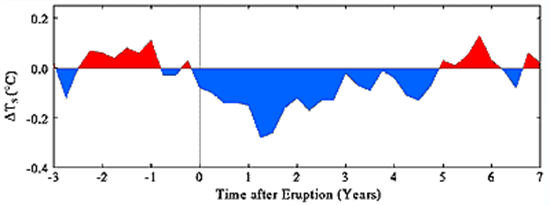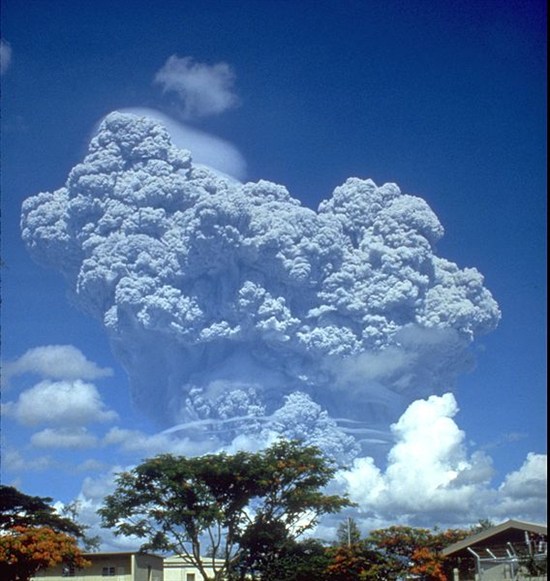Roz Pidcock
29.08.2014 | 12:00pmOvernight, a volcano in Iceland called Bardabunga began erupting, triggering a flurry questions about the possible impacts for the UK and further afield.
In 2010, Eyjafjallaj̦kull eruption in Iceland disrupted global transport Рshutting down air traffic across Europe for several days.
Volcanoes also have an effect on the climate. Throughout earth’s history, volcanic eruptions have punctuated the temperature record. We take a quick look at the role of volcanic eruptions in climate – past, present and future.
A tiny contribution to global warming
Volcanic eruptions can affect climate in two main ways. First, they release the greenhouse gas carbon dioxide, contributing to warming of the atmosphere.
But the warming effect is very small. Volcanic carbon dioxide emissions since 1750 are at least 100 times smaller than those from fossil fuel burning, according to the latest report from the Intergovernmental Panel on Climate Change (IPCC).
A two-year cooling effect
As well as carbon dioxide, volcanic eruptions also blast a cloud of ash, dust and sulphur dioxide into the stratosphere, which is quickly blown around the globe.
Sulphur dioxide combines with oxygen and water to form sulphuric acid “aerosols”. These particles directly reflect sunlight and encourage clouds to form.
This cooling effect outweighs the warming contribution from carbon dioxide, causing an overall cooling that tends to lasts for about two years after a major eruption.

NASA has shown the average effect of the five biggest volcanic eruptions this century is a cooling effect up to 0.2 degrees Celsius, lasting for about two years. Source: NASA-GISS
The eruption of Mount Pinatubo in 1991 was one of the century’s most powerful eruptions. Its huge dust and aerosol cloud cooled parts of the world by up to 0.4 degrees Celsius.
There have been no significant eruptions since Mt Pinatubo in 1991, though a few small events caused fairly significant cooling in the first decade of the 21st century. The 2010 Eyjafjallajökull eruption’s effect on climate was about 10,000 times less than Mount Pinatubo.
Short term impacts, but no lasting effect
Overall, volcanic eruptions have had very little influence on the temperature changes we’ve seen in the last century, except for the brief period following an eruption.
Along with other natural variability, such as ocean cycles and changes in the sun’s activity, volcanic eruptions contribute to ups and downs in global temperature from year to year.
Scientists think the cooling effect of volcanic eruptions together with a drop in solar activity since about 2005 is one reason why temperatures at earth’s surface have risen slower in the last 15 years than previous decades, for example.
Most of the so called “hiatus” in surface warming is down to natural cycles changing where heat is stored in the ocean, pushing it into deeper layers, scientists say.
Looking ahead
Scientists expect some large eruptions this century but can’t predict when.
Since any contribution to global temperature will be small compared to human sources, all IPCC’s forecasts for future warming assume no major volcanic eruptions.
Based on greenhouse gas emissions alone, the IPCC expects between 0.3 and 0.7 degrees Celsius temperature rise by 2016-2035 compared to 1986-2005.

The huge gas, ash and aerosol cloud blasted into the atmosphere by Mount Pinatubo in the Philippines, which erupted in 1991. (Credit: USGS)
Consequences for Europe
While volcanic eruptions don’t have a lasting effect on global climate, evidence suggests summers in Central Europe immediately following a major eruption are cooler and drier than usual. By contrast, winters in Northern Europe tend to be warmer and wetter.
Earlier this week, The Daily Express this week suggested a different – and rather more dramatic – outcome, saying:
“Britain could freeze in years of super-cold winters and miserable summers if the Bardarbunga volcano erupts, experts have warned.”
The Met Office says the impacts specifically for Britain have a lot to do with which direction the winds is coming from when the volcano erupts. At the moment, the Bardabunga eruption hasn’t produced an ash cloud, but scientists are monitoring it closely for further activity.
Geoengineering the climate
Volcano eruptions provide an insight into what would happen if we deliberately inject aerosols into the atmosphere. This has been suggested by some as a way to “geoengineer” the climate to bring global temperatures down.
Research suggests the impact on the global water cycle is likely to be large. Both the African and Asian monsoons were weaker in the year following the Mt Pinatubo eruption in 1991.

